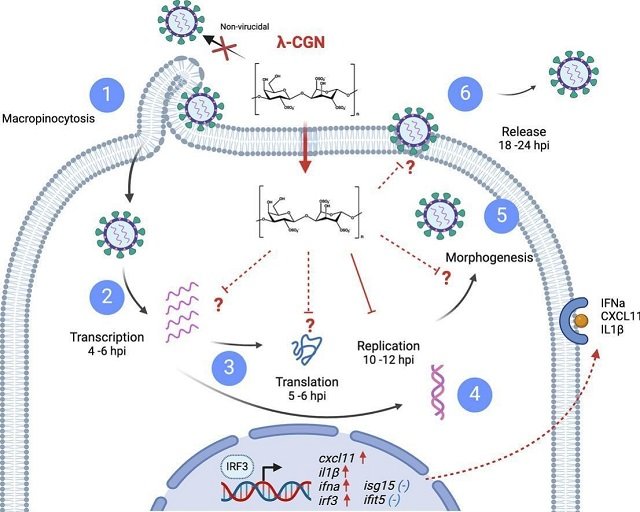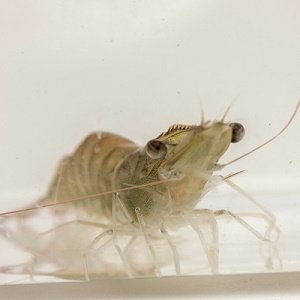
In the aquaculture industry, viral diseases pose a major threat to fish health and global food security. Infectious pancreatic necrosis virus (IPNV) is a particularly devastating pathogen that affects salmonids worldwide. Although traditional methods have been employed to control the disease, the emergence of drug-resistant strains requires the development of new antiviral strategies.
A study published by scientists from the University of Santiago, Chile, and the Autonomous University of Chile aimed to analyze the antiviral activity of lambda-carrageenan (λ-CGN) against infectious pancreatic necrosis virus (IPNV) and its possible mechanism of action in salmonid cells. The results of this study will provide valuable information on a novel and sustainable approach to combating viral infections in aquaculture.
A New Hope: Lambda-Carrageenan (λ-CGN)
Recent scientific research has highlighted the potential of lambda-carrageenan (λ-CGN), a sulfated polysaccharide derived from red algae, as a promising antiviral agent against infectious pancreatic necrosis virus. This natural compound has demonstrated significant antiviral activity against a wide range of viruses, including human viruses like SARS-CoV-2 and animal viruses.
Studies have reported that the antiviral effects of carrageenans stem from their ability to interfere with multiple stages of viral infection, including viral adhesion, penetration, replication, transcription, and release.
According to the results of the study published in the International Journal of Biological Macromolecules, λ-CGN exhibited a significant reduction in viral replication, with an IC50 (50% inhibitory concentration) of 0.9 μg/mL, indicating its potency against infectious pancreatic necrosis virus. Additionally, the selectivity index (SI) of λ-CGN was >142, highlighting its safety profile.
In comparison, other carrageenans, including iota, kappa, and lambda oligo-carrageenans (λ-OC), were found to be less effective against IPNV. Notably, λ-CGN showed no virucidal activity when applied directly to viral particles, suggesting that its antiviral mechanism may involve inhibition of viral replication rather than direct viral inactivation.
How Does Lambda-Carrageenan Work?
The exact mechanism of λ-CGN’s antiviral activity against infectious pancreatic necrosis virus is still under investigation. However, based on its known effects on other viruses, it is believed to interfere with multiple stages of the viral life cycle, including:
- Viral Adhesion: λ-CGN may bind to viral particles, preventing them from adhering to host cells.
- Viral Entry: It may inhibit viral entry into the host cell by interfering with the endocytosis process.
- Viral Replication: λ-CGN may disrupt viral replication by inhibiting viral RNA synthesis or protein production.
A Promising Future for λ-CGN
The findings highlight the potential of λ-CGN as a novel antiviral agent in salmonids and underscore the need for further research to confirm its in vivo pharmacological potential. The study’s results provide a promising basis for developing new antiviral therapies against IPNV and other viral diseases affecting salmonid aquaculture.
The use of λ-CGN as an antiviral agent in aquaculture offers several advantages:
Stay Always Informed
Join our communities to instantly receive the most important news, reports, and analysis from the aquaculture industry.
- Natural Origin: λ-CGN is derived from a renewable marine resource, making it an eco-friendly alternative to synthetic chemicals.
- Biodegradability: λ-CGN is biodegradable, minimizing its potential environmental impact.
- Safety: As a natural compound, λ-CGN is generally considered safe for aquatic organisms and humans.
While these findings are promising, more research is needed to fully understand the mechanism of action of λ-CGN and to assess its in vivo efficacy.
Conclusion
“This work determined that λ-CGN exerts an antiviral effect against IPNV in CHSE-214 salmonid cells. λ-CGN inhibited IPNV plaque formation, showing an IC50 of 0.9 μg⋅mL−1,” report the scientists.
In conclusion, the antiviral potential of carrageenans, particularly λ-CGN, against IPNV offers a promising strategy for developing sustainable antiviral solutions in aquaculture.
Contact
Mónica Imarai
Laboratorio de Inmunología, Centro de Biotecnología Acuícola (CBA), Departamento de Biología, Facultad de Química y Biología, Universidad de Santiago de Chile.
Alameda, 3363 Santiago, Chile
Email: monica.imarai@usach.cl
Reference
Espinoza, D., Laporte, D., Martínez, F., Sandino, A. M., Valdés, N., Moenne, A., & Imarai, M. (2024). Lambda carrageenan displays antiviral activity against the infectious pancreatic necrosis virus (IPNV) by inhibiting viral replication and enhancing innate immunity in salmonid cells. International Journal of Biological Macromolecules, 136875. https://doi.org/10.1016/j.ijbiomac.2024.136875
Editor at the digital magazine AquaHoy. He holds a degree in Aquaculture Biology from the National University of Santa (UNS) and a Master’s degree in Science and Innovation Management from the Polytechnic University of Valencia, with postgraduate diplomas in Business Innovation and Innovation Management. He possesses extensive experience in the aquaculture and fisheries sector, having led the Fisheries Innovation Unit of the National Program for Innovation in Fisheries and Aquaculture (PNIPA). He has served as a senior consultant in technology watch, an innovation project formulator and advisor, and a lecturer at UNS. He is a member of the Peruvian College of Biologists and was recognized by the World Aquaculture Society (WAS) in 2016 for his contribution to aquaculture.




